- Home
- Penelope Lively
The Road to Lichfield Page 2
The Road to Lichfield Read online
Page 2
She walked through the building and out towards the car park. A nurse came out and toured the benches and wheelchairs, adjusting a rug, trundling someone into the sun. Inside the building, there had been a room in which, through an open door, two old men could be seen sleeping in front of a television screen on which a woman briskly demonstrated the icing of a cake. This place must be expensive. How much? And had her father been clear-headed enough to work out that he could afford it? I should have asked the Matron, she thought, how stupid, I can’t go back now. And her head began to ache with this new concern. Perhaps there’ll be something at the house that’ll help. No, better perhaps go to his bank, talk to the manager. Blast, which is his bank?
She said ‘Midland’ out loud, at the same moment as someone came up alongside, saw that it was David Fielding and said, embarrassed, ‘Oh, hello. I seem to be a bit deranged – talking to myself. I’d just remembered something I was trying to think of.’
They walked together towards the cars. He said, ‘Have you come far?’
‘Berkshire. Not all that far but I’m not used to long drives, I suppose – my husband usually does the driving.’
They stopped. Anne felt all at once dulled by tiredness, and something else – shock, perhaps – detached from herself so that sights and sounds were magnified, but all sensations gone. She stood staring at this man, who was talking for some reason about fishing, and saw that he had a thin face with hair slightly greying at the sides and lashes curiously noticeable for a man and a spectacle mark at either side of his nose (he must wear them for reading). ‘Yes,’ she said. ‘Yes, I see.’ Someone was riding a grass-cutter up and down the lawn, and rooks swirled around a stand of chestnuts, so that the moment was tethered, and for ever would be, to its own backdrop of those particular sounds. Sunlight snapped from a car windscreen and David Fielding was saying, ‘Look, are you all right?’
‘What? Yes, I am. Sorry – I suppose I’m a bit tired, in fact.’
There was a pause. The grass-cutter came closer, turned, and set about its return crawl up the lawn. The rooks planed in the wind. Anne groped in her pocket for the car keys, found them, stared down at them, and said to this stranger, ‘My father’s going to die.’
‘Yes,’ said David Fielding. ‘Yes, I’m afraid he is.’ And he laid his hand for an instant on her arm, removing it almost at once so that it was only later, at another time, that she felt his touch, in the way in which recollection can sometimes be more real than experience itself.
‘Look,’ he said, ‘Are you sure you’re all right? Would you like to come and have a cup of coffee or something?’
‘No, really, I’m fine.’ She smiled, to demonstrate, and indeed as she said it a new wave of this lurking energy came back. Bank, shopping – there’ll be no food out at the house – then start sorting out. ‘I’m fine. It was just the drive and everything. Goodbye again. And thank you for being so kind to my father, visiting him.’
‘It’s he who has been kind to me in many ways. He was a very agreeable neighbour. I’ll drop the rod in sometime.’
‘What?’ But he was already getting into his car (not very new, rather grubby, the back shelf littered with the bits and pieces of family life, Kleenex and a thermos and a slithering pile of exercise books). Rod? He must have thought me very off-hand. And suddenly the pressure of his fingers on her arm came back. She sat still in the driving-seat for a moment before starting the car
Old Mr Stanway lay propped up in bed and wondered what time of day it was. At some point recently, he knew, there had been people in the room, talking. One of them, he was almost certain, was his daughter Anne. The other, a man, he had recognized but now could no longer identify; perhaps it had been her husband. In the corner of the window there was an outline he could not quite make out. He screwed up his eyes, peering, and thought that it was possibly an aeroplane, or some very large bird. While he was in the middle of this a strong, competent arm came round behind him, hoisted him higher on the pillow and gave him a cup of tea. Since the cup of tea required all his concentration he abandoned the matter of the aeroplane, or bird, but it came to him as he drank that if the window was light it must, at any rate, be daytime. He smiled in silent triumph and someone he had not known was in the room said, ‘There, nice to see you feeling cheerful, Mr Stanway.’ The tea was hot, but not sweet enough.
The bank manager said ‘He’s not in BUPA or anything like that?’
‘I don’t think so.’
‘We can make sure, of course. I need,’ he went on, with a trace of awkwardness, ‘a certificate from the doctor confirming his – the failure of his mental powers – and then I can discuss the state of the account with you, Mrs Linton.’
‘Oh, should I …’
‘I’ll telephone them. I’m sure you have plenty to do this afternoon. And then I’ll go over the figures again, and check some share prices, and perhaps tomorrow I can give you a ring with a clearer picture of how we stand?’
Anne said, ‘Thank you.’ She watched the bank manager draw a neat black circle round a figure he had jotted down on his pad and thought: he doesn’t know what to divide it by. She said, ‘Apparently we should think in terms of months, or even weeks.’
‘Ah. I don’t really imagine, Mrs Linton, that there is anything to worry about. The pension and securities should cover it perfectly well. But I will go over everything.’
She drove out to Starbridge along quiet lanes, quite unlike the busy roads – dual carriage-ways and snatches of motorway – on which she had travelled from Cuxing. She saw, for the first time today, the landscape gleaming with spring; dandelions at the roadsides, the sheen on a field of grass, the plumper outline of trees. A thin sunshine reddened the bare earth of the fields; flights of small birds showered from the hedgerows at the car’s approach. The road reached out ahead of her, empty of traffic, darkly grey between the green verges, its width neatly defined at every bend by a run of white lines in the centre. She could have been quite alone on it, as though it were there for her only. Behind her, clear in the driving-mirror and yet curiously diminished, it reached away again in reverse. She drove watching the road ahead and with one eye at the same time on the mirror, to keep this double image of advance and retreat. She passed a cyclist, and the anonymous, androgynous backview became in the mirror a tow-haired boy, red with exertion, bent over the handlebars, dropping further and further behind until a bend in the road took him away altogether. He might have been Graham, in their shared childhood, off on his private male pursuits, already exclusive and faintly improper. It was all brothers and sisters did share, she thought – time, and a humdrum assortment of memories. And then time-with-parents-and-brother became time-with-husband-and-children. Places shared with one lot were overlaid by places shared with the other. In between, a slice of solitude.
I hardly ever, she thought, go anywhere alone. Travel. You are alone in days, for bits of days, nights even, seldom is moving from one place to another done alone. Not for a long time, not since before we were married. And she felt, driving this road, as though the sequence of her own life had been tampered with, as though she were again the young woman who used to come up here to visit her parents. The edge of her own face in the driving mirror, eye and swatch of hair, was not, fleetingly seen, so very different after all from the face of twenty years ago. That eye, though, that eye of 1955, knew nothing of Don, nor Paul, nor Judy. Nor of things like this housing estate on the edge of the village or that supermarket so grossly set down between the pub and the church. They’ve ruined this place, it used to be lovely when mother and father first came here, just old brick and half-timbered things.
Except, of course, her father’s house, itself an intrusion of the nineteen twenties. Why this, father, why not a nice old cottage? And he’d scoffed at her for a romantic: all very fine, but I want a roof over my head that doesn’t need propping up every few years.
It’s an ugly house, she thought, staring at it for a moment before getting out of the ca
r. But of course he came here for the river, the fishing, the house was neither here nor there. And mother had to take it or leave it, I suppose, but she always seemed happy enough.
She carried her things inside. As she stood in the dank-smelling kitchen the leaden stillness of the house seemed callous, so empty of those two familiar presences. But her mother had been dead ten years now: the image of her aproned figure washing dishes at the sink was dimmed by that stretch of time, and fossilized by it too, leaving her, forever now, younger than her husband, more spry, not deaf nor bent. Not diminished in stages, a little more each week, each month.
Anne went round the house, flinging windows open. In the spare bedroom, where she would sleep, her own past proffered itself in concrete form: a row of her old books on the mantelpiece, a spurned wedding-present vase on the windowsill, a pair of her shoes in the wardrobe. She set about finding sheets and blankets, lighting a fire in the sitting-room. She went out into the garden and picked the last of the daffodils and some branches of flowering currant. Presently, sitting by the fire over a cup of tea she felt a small satisfaction at having rescued the place from its indifference. Just now, coming in, it had felt as though her father had never been here, even his familiar tobacco-smell driven out by the damp and cold. In the garden, though, the flowerbeds were blurred with weed and the grass long. Perhaps there would be time to do something about that, too.
Mrs Ransome had, evidently, been coming in to clean and tidy. The kitchen was spotless, all scraps of perishable food cleared away, the fridge turned off. Anne opened a cupboard and thought: heavens! I never knew he went in for this kind of thing. The collection of tins and packets was like a schoolboy’s tuckbox hoard; exotic soups, a magpie store of biscuits, pâtés, expensive jams. She thought of her mother’s sensible, unadorned cooking. The contents of these kitchen cupboards seemed like a belated protest. She ferretted further, curious now, and found tucked away in another cupboard, thick with dust, the nineteenth century Staffordshire plates that her mother had collected over the years and that had previously been ranged on the dresser. The dresser held now a functional assortment of crockery. Had he always disliked those plates? She started to take them out, and then, muddled by the vague conflict they suggested, closed the cupboard again and continued her investigation of the kitchen. She had forgotten to buy any food for herself but there would be no need. She could feed off those motley tins.
The study was clean and tidy too, the familiar litter of papers on the desk trimmed into neat but arbitrary piles. There were a few unopened letters. Reluctantly – what deep-seated taboo forbade you to invade a parent’s privacy? – she sorted through them. A couple of circulars (throw away), the electricity bill (pay that), a curt note from the telephone people threatening to disconnect (pay that quickly). Something private, in an unknown handwriting. That must be taken to him and read aloud, perhaps. A postcard of some Italian resort from Graham, several weeks old (‘A couple of days here as a perk at the end of a filming assignment, hoping to get up to see you soon …’). She glanced at the top paper in one of Mrs Ransome’s random piles and saw that it was a renewal reminder from an insurance company, a couple of months old – the house insurance. Under it was a letter from her father’s stockbroker, asking apparently for the second time, for some instruction. She realized, sifting quickly through the pile, that her father had ignored these. His systematic red ticks at the foot of correspondence dealt with had ceased a couple of months back. She sat at the desk, chilled by this suggestion of the old man’s solitary decline, and thought: I’ll have to do something about all this, there may be other urgent things like the insurance. She felt again a sense of intrusion. But it’s no good, someone’s got to, me or Graham, and Graham can jolly well come up and do his bit. I’ll have to ring him, blast it, and go through all the business of how he’s a bit pushed at the moment but he’ll try to get up, and listen to him trying to remember how old the children are and what Paul’s name is. And there’ll be people noises in the background; talking and glasses chinking. And anyway in the end, eventually, all this stuff has got to be cleared out, we might as well start now, there’s no point in being squeamish.
She had a meal and then went back to the nursing-home. Her father was more confused than in the morning and hardly responded to her. She read his letter to him – from a former colleague, oddly impersonal, talking of the economic situation, Ireland, as though retirement and old age removed the right to private preoccupations. Or was it the opposite – a determination to be involved with the public world? But her father had dozed off before she reached the end of the letter: she left it by his bedside.
It was still early when she got back to Starbridge. She was brought out of a bath by the sound of the telephone and went to it expecting to hear Don’s voice.
‘Anne?’
‘Graham!’
‘How are things?’ His voice, muted by distance, sounded thin and sober.
‘Not too good,’ she explained. Ending, her own voice fell away into silence. ‘Hello? Are you still there?’
‘Yes. Look – I’ll try to get up at the end of the week, or early next. I daresay I can scrap something.’
‘I think you should.’
‘Right-o. Will do. How’s Don?’
‘Fine.’
‘And the kids? Far too long since I saw them. Judy and, er .. ’
‘Paul.’
‘Growing up, I suppose?’
‘They’re thirteen and fifteen,’ Anne said. ‘Yes, they’re growing up. Children do.’
‘True enough. You sound a bit stroppy. Anything wrong?’
‘I’m tired, that’s all.’
‘It was bound to come, you know, Annie, sooner or later – Dad.’
‘Yes, I know.’
‘Are things O.K. financially?’
‘I think so. The bank manager’s being very helpful.’
‘Let me know otherwise – I can always chip in.’
‘Yes, I will.’
When she had rung off she picked up the phone again and dialled her own number. Waiting for Don to answer, she pictured the empty hall in which it rang. It seemed removed from her by more than the road to Lichfield, momentarily inaccessible as though it were in a different sphere of time, not space. For reassurance, she toured it in her mind’s eye, moving from door to window to the print of York Minster above the radiator. And then Don’s voice broke in and they talked of her father, and of an arrangement for the weekend, and of Anne’s journey.
‘Car behave all right? Did you get that indicator seen to?’
‘Yes. No, I will do – I meant to. I’ll go to bed now, darling, I’m dead tired. Oh, Graham rang just now.’
‘You do surprise me.’
She lay in bed, reading a copy of Brideshead Revisited that carried her own unmarried name on the flyleaf, written in angular, schoolgirl script. She felt cold in the unaccustomed emptiness of a single bed, no warm flank against hers. Once, a long time ago, shared nights had been translated from furtive hours to the amazing rapture of security. And thence to unconsidered acceptance. I am no more used to sleeping alone than to travelling alone, she thought. And, despite her tiredness, a great surge of sexual desire swept through her, latent in her body, she realized, all that day, and somehow prompted by the touch of that schoolmaster’s hand laid in passing sympathy on her arm. She heard again rooks and lawnmower as she switched the light out and turned to go to sleep.
Graham Stanway telephoned the divorced lady with whom he was, on two or three nights of every week, sleeping. ‘Look,’ he said, ‘I shan’t be able to make Friday. I’m most frightfully sorry, love, something’s cropped up.’ The divorced lady, who had a second, back-up arrangement available for such an eventuality, made some outline plans (to herself) and noises of protest and regret (to Graham). Then she said, ‘Why?’
‘My father’s not so good, up in Lichfield. Matter of fact, I’m rather afraid he’s going to pop off before too long.’
The divorce
d lady said, ‘Oh darling, how wretched for you, I am sorry. Are you terribly fond of him?’
Graham said something about always getting along all right. The divorced lady said again how wretched and then launched into a rather scabrous story about a mutual acquaintance of theirs (older, and female) at which Graham laughed quite a lot. During the course of the tale she let it drop that she had been out, recently, with another mutual acquaintance of theirs (younger, and male). They then exchanged some further remarks of affection and anticipation and hung up. The divorced lady, in her flat, picked up the telephone again almost at once. Graham, in his, poured himself some whisky and went to stand by the uncurtained window; five storeys below, the tail-lights of cars blinked in a traffic-jam and reminded him, unaccountably, of a fun-fair. Once long ago, he had ridden on a dodgem or some such thing at a fun-fair and red lights had glittered, thus, against a backdrop of water, as, now, the Thames shone black beyond the Embankment (Graham’s was an extremely choice and expensive view). He was nagged, irritatingly, by this fitful memory until all of a sudden it clarified itself. In Southwold, once, on holiday when he and Anne were kids, there had been such a fun-fair on the promenade; the lights, the sea. Christ, he thought, whatever brought that back? He was not a man much given to recollection. He finished his whisky and went to bed, alone.
Two
‘And there’s this monthly payment to Mrs Barron,’ said the bank manager. ‘Is that to continue?’
Anne said, ‘Mrs Barron?’ Behind the manager’s voice on the telephone she could hear the click of a typewriter.
‘Mrs S. Barron of Gloucester. 16 Ellesmere Road. Paid into the Gloucester branch of the Midland.’
‘I’m sorry. It’s just I can’t quite think for the moment what that can be …’

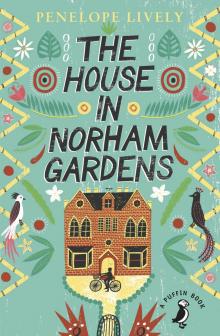 The House in Norham Gardens
The House in Norham Gardens Family Album
Family Album Life in the Garden
Life in the Garden Oleander, Jacaranda: A Childhood Perceived
Oleander, Jacaranda: A Childhood Perceived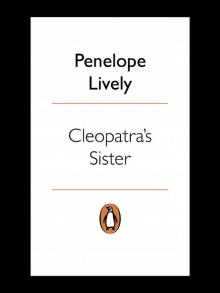 Cleopatra's Sister
Cleopatra's Sister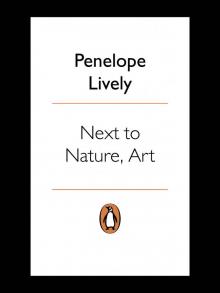 Next to Nature, Art
Next to Nature, Art A Stitch in Time
A Stitch in Time Moon Tiger
Moon Tiger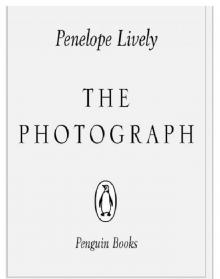 The Photograph
The Photograph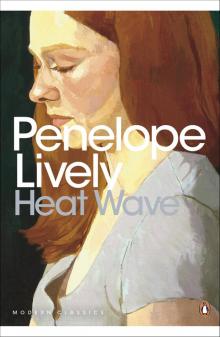 Heat Wave
Heat Wave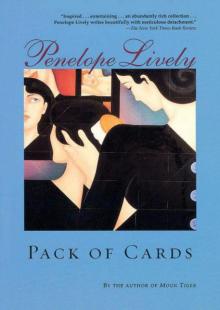 Pack of Cards
Pack of Cards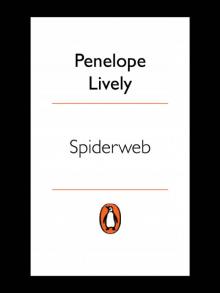 Spiderweb
Spiderweb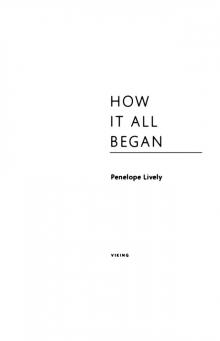 How It All Began
How It All Began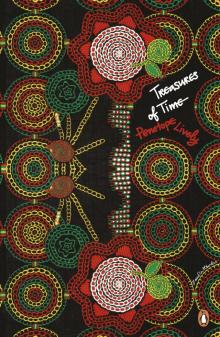 Treasures of Time
Treasures of Time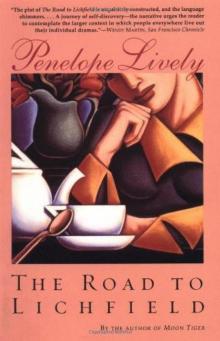 The Road to Lichfield
The Road to Lichfield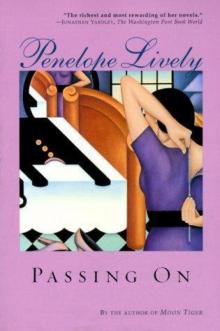 Passing On
Passing On Making It Up
Making It Up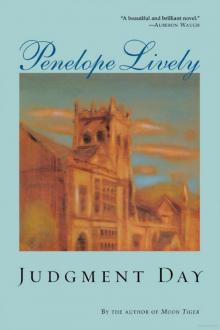 Judgment Day
Judgment Day The Purple Swamp Hen and Other Stories
The Purple Swamp Hen and Other Stories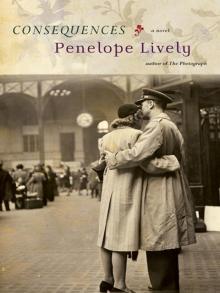 Consequences
Consequences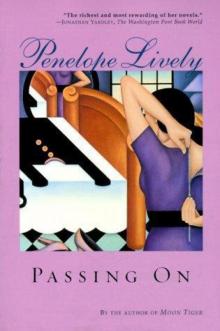 *****Passing On*****
*****Passing On*****